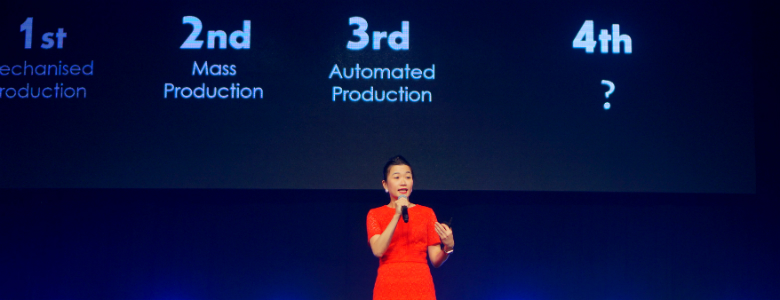Diversity and Equality in Tech

Flashback to 2014.
There were audible groans heard across the internet when toymaker Mattel released a seemingly progressive children’s book titled Barbie (I Can Be…) A Computer Engineer. In it, Barbie appears to be developing a computer game, but soon enough, it becomes clear that she is “only creating the design ideas” and she “[will need] Steven’s and Brian’s help to turn it into a real game”.
To make things worse, she ends up infecting her laptop with a virus, has to ask for help to run a simple antivirus program, and eventually takes credit for her male colleagues’ work.
With so much conversation around gender roles nowadays, Mattel understandably faced plenty of backlash, with parents and netizens accusing the book of being sexist and perpetuating stereotypes.
But in June this year, Mattel made a big about-turn, releasing Game Developer Barbie, who has real code on her computer, according to Ms Jacqueline Poh, CEO of Government Technology Agency Singapore (GovTech).
“I think they’ve made a huge improvement in terms of the perception of what women can do in technology,” said Ms Poh during her opening keynote address at Women in Tech, a partner event of Techventure x Slush Singapore at the Singapore Week of Innovation and Technology (SWITCH) on 21 September 2016.
Diversity, for Innovation’s Sake
According to Ms Poh, Singapore’s push towards a Smart Nation will not only require innovation and risk-taking, but also diversity.
“We’ve heard a lot about innovation in Singapore, but innovation reaches out to the customers of both genders. It is about men and women. It is about all the people and younger people, people of different races,” she said. “So, diversity is critical to innovation.”
Singapore’s record in diversity with regards to the technology industries echoes what many other countries are facing — out of every ten IT professionals, only three are women, Ms Poh observed. It’s the same situation in the science, technology, engineering and mathematics (STEM) and IT faculties in local educational institutions.
In the newly-formed GovTech, it’s only slightly better, she noted: it’s four in ten.
Nevertheless, Ms Poh acknowledged that Singapore has made great strides in terms of supporting and empowering women in technology.
“One of the ways we have done so is to ensure that Singapore is Forbes’ top city in Asia Pacific for women entrepreneurs,” she said. “A lot of the women tech leaders in Singapore are female.”
Indeed, in many of the competitions that GovTech holds for coding and robotics, it’s actually the teams of girls who are winning, Ms Poh shared, adding that she sees “huge potential and promise” in the next generation of women technology professionals.
In essence, tech companies should embrace what women coders, programmers and IT professionals have to offer, as that is the way toward true innovation, she stressed.
“Smart Nation requires people to be innovative. Innovation requires diversity; diversity requires women. And diversity, innovation and Smart Nation require your participation,” she concluded, addressing the entrepreneurs, innovators and IT professionals in the crowd.
The Democracy of Education
With fast-paced innovation, comes widespread automation today.
Much like the ones before, the ‘fourth industrial revolution’ that we’re in now, has brought forth new ways of production.
Faced with the threat of obsolescence, workplaces—and skills that are in demand—are fast evolving.
“Work is different now,” noted Ms Ayesha Khanna, founder of Lionlabs and 21C girls, a tech agency and tech education centre respectively.
She delivered a talk titled ‘Future Skills vs Today’s Reality’ at the Women in Tech event.
“A 2013 Oxford study revealed that 47 percent of total employment in the US is at risk of automation in perhaps a decade or two,” she explained, adding that there’s a high chance that jobs such as telemarketing and technical writing won’t exist in twenty years.
“Even CEOs do so many things that are routine and can be automated,” she said with a laugh.
Most strikingly, the current most popular course at Yale Law School for first year students is Artificial Intelligence, Robotics and the Law. Law students are not only interested in Socrates, but also startups, she said.
As the skills of the future evolve, along with the proliferation of internet access, this opens up the chance for equal opportunities, particularly for those in emerging economies. As such, we should look forward to the democracy of education, Ms Khanna noted.
“When I was growing up in Pakistan, I would often pass by poor mechanic boys while sitting in my air-conditioned car,” she said. “I would often feel sorry for them; they never had a chance because of an unfair, elite advantage. But now, that boy can take a programming or robotics course, download it on his mobile phone, and use a cheap 3D mobile printer.”
Ms Khanna also quoted Coursera, a company that offers free massive open online courses. Coursera is not raising money for developed nations such as Singapore or the United States, she said.
Instead, they are raising investment funding to expand to the developing world—Brazilians, Chinese and Indians are actually the ones completing the free educational courses.
“It has been too long that we have had an elite advantage, and I welcome the fact that it is now very officially over.”
https://www.tech.gov.sg/media/technews/diversity-and-equality-in-tech
